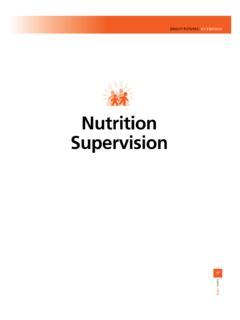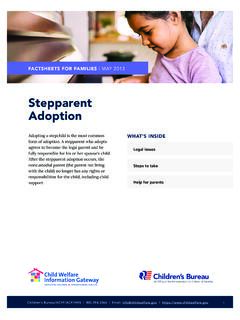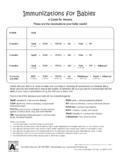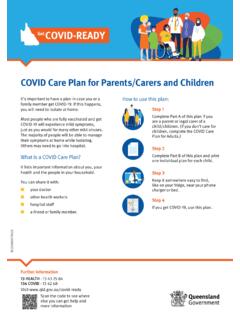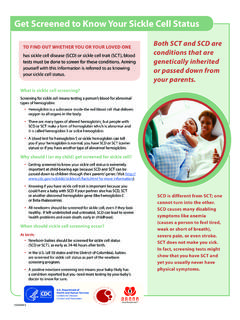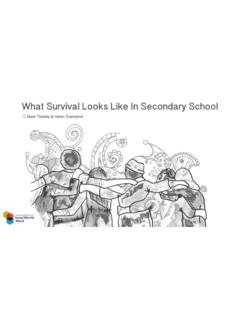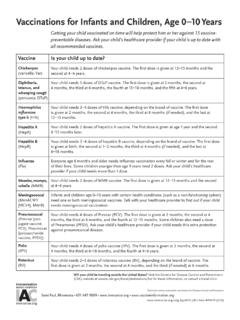Transcription of The Role of Parents in the Education of Children
1 Journal of Education and Practice ISSN 2222-1735 (Paper) ISSN 2222-288X (Online) , , 2016 61 The Role of Parents in the Education of Children Ardita Ceka1* Rabije Murati2 of Philosophy, University of Tetova, 176 , Tetovo,1200 Macedonia of Philosophy, University of Tetova,1200 Macedonia Abstract The home Education as a term, represents educational impact of the family on Children . It has been proved that in various family environments, Children do acquire a variety of experiences, through performing various activities and is constantly exposed to a range of influence and expectations from the people he/she cohabits. In this paper we will analyze the influence of the Parents over their Children s Education within family environment. It will focus issues why each family has different educational potentials.
2 In nowadays social circumstances, the family has a huge and very tough responsibility; as it has to take proper care on their health, their physical development, their overall Education , the development of their intellectual affinities, as well as creation for a better moral values and convictions and attitudes, habits to a firm and well behaved cultural relations in the family itself as well as in the society where the child lives. On the other hand, the family as an institution has to create conditions for development of positive relationship towards work, which as such is a predisposition towards a better establishment of a realistic approach for a better development of the Children s personality. Keywords: Children , Education , family relationship, father s role, mother s role 1. Introduction It is an undeniable fact that Parents are the ones who brought the Children in life, it is simply their married.
3 They are the ones who reproduce the human kind in a given society, as in this way they contribute to the development of the human history. Parents or family as a whole, are one of the direct holder of educational work. (Emerllahu, Dali, 1998) The term parent should be comprehended as a set of notions such as: 1. Firstly, their planning and decision to Children birth and the overall nativity rate , their care and contribution towards rising their Children , the Parents actions and activities towards an overall parental achievement of a priori set goals The family as a cell acts only with love and respect and it dominates the understanding, affection, sacrifice and childcare. (Emerllahu, Dali, 2001) So, in this way builds family environment, in which we live, laugh, play and develop Children . (Claudia&Eberhard Muhlan. 2008) The contemporary concept over their role and contribution in this regard, in a way rejects the so called single direction of influence of the Parents over their Children development, replacing it with an intense interaction of three factors such as; the child, the parent and the wider social environment.
4 This interaction is constantly being seen as a mutual influence and process moving from the parent to the child and the other way around, which as such triggers a variety of factors which in one way or another may impact the Children s development and Education , in both, positive as well as negative sense. The Parents take a crucial stand, when it comes to their Children s development and Education as whole, as the Parents themselves are the ones to take care on the overall Children physical and intellectual development, till the point they get independent and ready to face the challenges of the society they live in. Parents are aware of the work on the development of Children , but at the same time they need pedagogical information on the right to Education of their Children . (Mojsovsja Koteva Tatjana. 2006) Just for these reasons, the pedagogues and psychologists as well as other researchers, emphasize in an argumentative way, the role of the Parents in their overall Children s development, focusing the development of their personality in the family and wider.
5 It has been said that the so called Children s development climate , more frequently has been seen from the perspective of three interacting factors or dimensions such as; happiness or pleasure to their Children s achievement; and the stress that imposes the parental role in the process; 3. The feeling regarding the parental competences towards their Children overall development The Education for life in a given family commences with the first days of the child s live. It is consisting mainly of acquiring experience which is usually affected by constant learning. (Lakinska, Divna, 2006) In this regard the Parents as well as the family as whole, play the role of the direct leaders as well as supporters of the implementation of the Education of their Children . As this is one of the core factors of influence, it can be seen as the fundamental one which with no doubt has a greater influence on the overall development and creation of the human personality.
6 When Parents involve themselves in the Education process of their Children , usually the outcome can be qualified as a positive and encouraging one. In this regard, they are usually connected and act under their own parental attitudes, which are transmitted through their demonstration of mutual confidentiality regarding the Journal of Education and Practice ISSN 2222-1735 (Paper) ISSN 2222-288X (Online) , , 2016 62 Children s capabilities and their overall learning capacity which leads them towards succeeding over the learning, Education as a complex process. Therefore, Parents should get involved in supporting their Children in doing their homework, as in this way they offer their parental support as one of the key strategies leading towards a successful Education of their Children at school.
7 Educational level of Children in the family depends more on the level of the parent s Education , so this factor strongly affects family relationships and the successful development of Children . (Matilov, Naum. 2002) In order to have good results at school, the parental control over the child needs to be permanent. On the other hand, in order to have success within the educational activity we are performing with the child, we need to be familiar with the some rules which are connected to the Children physical development and furthermore, a special focus must be put on the child s psychological development as well. In the family are functioning these elements, which are: love, marriage, the care and happiness, elements related to the functioning of life and the future. (Vukasocic, A. 1994) Children have two main educators in their lives their Parents and their teachers. Parents are the prime educators until the child attends nursery or starts school and remain a major influence on their Children s learning through school and beyond.
8 But, mother is always closer to Children . (Beqja Hamit, 2002) Parents are their Children s strongest role model and greatest influence. Children always adopt parent s values and types of behavior. (Kasapi, Gjylymsere, 2013) However, if Parents are a positive influence in their Children s everyday lives, and most importantly in their everyday Education , the future it will be more beautiful and more successful. (Colanoiq, Vera. 1972) 2. The mother as an educator Mother is the first and the best teacher- proverb The family enables Children protection in that suggestively that makes Parents responsible for their developing and to make their Children grow into a total personality. (Good, 1988) The role of the woman or the mother as an educator represents a crucial resource to the development of the individual identity, which from researchers is seen even as more important as the very marital status of the Parents and the occupation of the Parents themselves.
9 It seems that the feeling of being a mother, to the woman is more powerful than being a father of given child for the husband. Always in accordance to the biological as well as physiological relation of mother to the child, represents the first and reasonable part or segment of the child s development. This for the reason that mother assures child s life, as she is the one who brings the child in this world, and further on she raises them from being little towards reaching a total independency in mature life. The mother s function in this regard, has a very important role which as such may be divided into two parts or directions: The first one is related to the child s defense, while the other one to the child s overall development. Mother s protection as a function embeds several types of actions or types of functions. The 1st type is connected to the physical protection of the child, which means that the child must be provided healthcare and hygienic conditions, so that he/she could have a healthy life in a worm home environment in every sense of the word, including here the ambiance where the child lives, which must be well enlighten, a healthy place which offers the child to be showered, feed up and taken care in general.
10 The 2nd type is the Psychological protection, which can be reflected through the child s emotional security and psychological protection, especially in moments when the child feels it when the mother is next to him her. Another group of activities in this regard, are the maternal functions regarding the child s development involving here the physical development, the intellectual development as well as the emotional development of the child. (Grancic, Radovan, 2006) Each child which grows up and is educated in the presence of mother, for sure is expected to reach an appropriate physical, psychological as well as social development. In this regard, these Children have a much better appearance, the look happy and they enjoy the childhood in general. They are communicative and as such they are ready to cooperate. (Brada, Riza. 1995) For this reason, mother s love and care to the child, is full and well completed, and as such is often accepted by other members of the very family.










